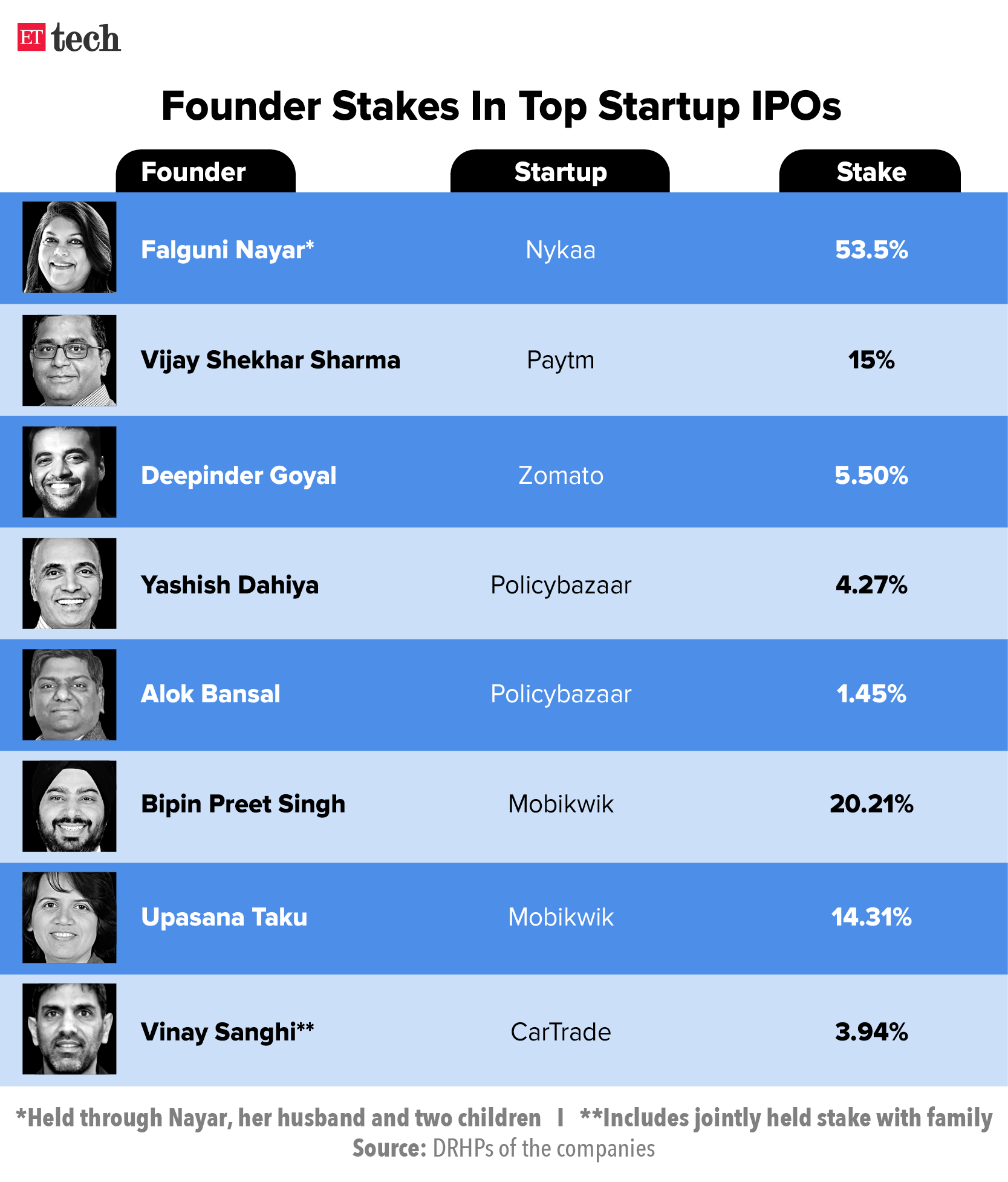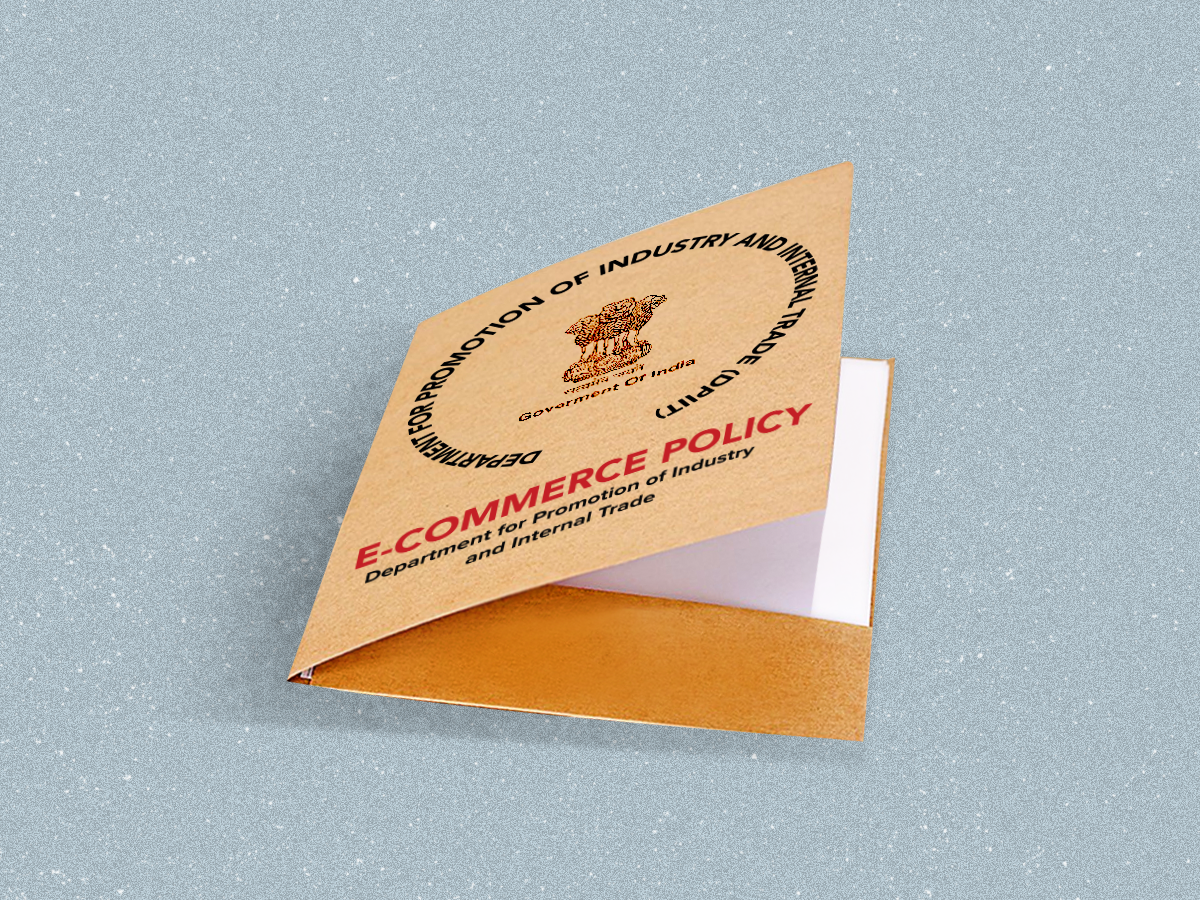How Nykaa’s IPO is different from other startups
This is not your typical, hyper funded consumer internet startup, as everything about it is different when compared to the other tech IPO candidates. We will unpack it all in today’s letter.
Also in the edition..
- Govt may talk to all stakeholders on e-commerce rules
- ‘
Google Tax ‘ puts Amazon, FB, Apple, LinkedIn, Twitter in a spot - ETtech Done Deals
Nykaa’s founder to remain in the saddle

It’s Digbijay. Nykaa’s upcoming IPO has many firsts associated with it, thanks to its founder Falguni Nayar.
To begin with, her venture is a profitable e-commerce startup going public. She is the first woman founder of a unicorn taking her company public. She owns more than half of Nykaa’s parent firm FSN E-commerce Ventures and she will also have rights, after the IPO, that will ensure a tighter grip over the company she founded in 2012.
Sure, her rights are an outcome of the majority
A person aware of the thinking at Nykaa told us, this was always the plan and even after the IPO, Nayar will have a majority stake and will remain in-charge.

What rights: Falguni, her husband Sanjay Nayar – chairman of private equity major KKR India, and their two children own over 53% stake in Nykaa. A chunk of it is owned by two trusts- Falguni Nayar Family Trust and Sanjay Nayar Family Trust. Falguni and Sanjay are the trustees.
Falguni, as a promoter, will have the rights to nominate up to 50% of the number of directors on the board as well pick at least one such nominee director as a member on each statutory or other committees constituted by the board. This would be valid as long as Nykaa promoters hold more than 25% in the company.
There’s more: As long as Falguni, Sanjay and the two trusts continue to be classified as promoters of the company, they can nominate up to one-third of the number of board of directors as well as nominate at least one such nominee director as a member on a committee constituted by the board.
Promoters of Nykaa will have the right of first refusal when a shareholder with less than 3% is selling shares of Nykaa. As we mentioned earlier, these rights are an outcome of the majority shareholding Nayar and her family has as promoters.
Quote: “For a majority stakeholder, these broad rights can be accorded as per the laws. However, she is the only founder among the top-tier founders to have such a stake in the firm going into the IPO,” a senior industry executive who has worked with startups on IPO regulations said.
We also spoke to people aware of Nykaa’s business plan and the recovery from the second wave of the pandemic. Here are the top takeaways :
After the second wave’s disruption, sales have recovered to pre-second wave levels. The overall impact on monthly sales was relatively less during the second wave compared to the first. Online recovered faster but Nykaa’s omni-channel presence has helped it amidst all of this. Last year, Falguni told ET more about it in an interview.
We also covered Nykaa’s issue size and other details in ETtech Top 5 here.
Read more about Nykaa’s shareholders and how its captable has evolved through the years.
Tier 2 and 3 cities are driving growth recovery for Nykaa. According to a source aware of its metrics, non-metros have seen a sharper rebound in demand than metros. In its DRHP, Nykaa has said tier 2 and 3 cities contributed 64% in FY21 compared to 59% in FY20.
It sells several third-party beauty and lifestyle brands but it is also building a fashion business as well as its own brands across segments. Fashion is now 20% of overall sales. Private labels are growing but still relatively smaller in size.
Sources said it is keeping a close eye on draft e-commerce rules being debated now. It could have an impact on it. “There shouldn’t be different rules for online and offline commerce,” a source aware of Nykaa’s thinking told us. Nykaa has also flagged this as a risk in its DRHP.
It had a couple of washout months last year and yet clocked growth in sales compared to the year before. This year too, sources told us, Nykaa is confident of clocking higher sales on an annual basis.
In FY21, its gross merchandise value or GMV jumped by over 50% to almost Rs 4,046 crore in FY21. Its total revenue grew 38% in FY21 to Rs 2,452.6 crore. Nykaa reported a profit of Rs 61.96 crore in FY21 compared to a net loss of Rs 16.34 crore in FY20.
Govt may talk to all stakeholders on e-commerce rules

The consumer affairs ministry is likely to hold talks with traders, micro, small and medium enterprises (MSMEs) and representatives of e-commerce firms before finalising the proposed amendments in the Consumer Protection (Ecommerce) Rules 2020, sources told us.
The story so far: Online retailers had last month raised concerns about the draft e-commerce rules with government officials and sought more time to suggest changes.
On July 22, we reported that industry associations, including those that count eCommerce majors Walmart-owned Flipkart and Amazon India as members, have sought the revision of a host of contentious clauses in India’s draft e-commerce rules including the deletion of those seeking to include related parties and logistics service providers within the definition of an e-commerce entity, ban flash sales and mandate the listing of local alternatives while selling imported goods or services.
Companies are hopeful that the government will dilute certain clauses in the draft rules released in June.
Tweet of the day
‘Google Tax’ puts Amazon, FB, Apple, LinkedIn, Twitter in a spot

Google’s plan to pass on India’s 2% equalisation levy to all its clients, even if they aren’t based in India, is set to cause trouble for companies such as Amazon, Apple, Twitter, Facebook and LinkedIn.
Why is it significant? The tax department is likely to ask the other big tech companies to follow suit. These companies haven’t decided to pass on the levy to customers but the taxman could take Google’s stance as a precedent and demand that other big tech companies follow suit.
The levy is applicable even in cases where both the buyer and the seller are not based in India, if the advertisement is visible in India. The levy will also apply in cases where Indian IP is used.
BharatPe gets unicorn status, and a new CEO

BharatPe founder Ashneer Grover
BharatPe, an online payments startup focussed on offline retailers and merchants, said it has raised $370 million in a funding round led by New York-based Tiger Global. The company’s valuation has reached $2.85 billion, post the investment.
- The fundraising gives the company capital as it takes over PMC Bank along with Centrum Financial Services to create a small finance bank.
The company has been in the news for its ultra-competitive hiring strategy. Recently, founder Ashneer Grover posted on Linkedin that BharatPe will offer BMW bikes, in-vogue gadgets and “cri(work)cation” in Dubai for the ICC T20 World Cup later this year. The programme has now been extended for hiring product managers as well. You must read this edition of ETtech Morning Dispatch to get all the details of this over-the-top, talent-luring perks.
Deal details: Apart from Tiger Global, which has been aggressive with its India play, a slew of other investors also participated in this round.
- Two new investors — Dragoneer and Steadfast Capital — have come on board.
- Existing investors Coatue, Insight Partners, Sequoia Growth, Ribbit Capital and Amplo also participated in the fundraising.
- The company said it has completed a $20 million secondary share sale as part of an employee share buyback programme.
“We now have $500 millon cash on books and are extremely well-capitalised to deliver on our mandate to build India’s first truly digital bank,” Grover said. “Rarely does one witness the original thesis play out without any pivot. BharatPe will remain maniacally focused on lending as the core business and small merchants as our primary target segment.”
New CEO: BharatPe has elevated Suhail Sameer, who had joined the company as group president last year, as chief executive officer. He replaces Grover, who will transition to the role of managing director.
Also Read: Making sense of BharatPe’s banking foray
In other deal news…
■ Yellow.ai, a customer experience automation platform, has raised $78.15 million in Series C funding round led by Westbridge Capital to strengthen its geographical presence in the over 50 countries it operates in.
■ Online-first fashion retailer The Souled Store said it has secured Rs 75 crore in Series B funding led by Elevation Capital. The company said it will use the funds for expanding its product portfolio of both licensed merchandise and casual wear, building offline retail presence pan India, expanding its manufacturing capabilities, and to hire talent.
■ Social investment startup StockGro has landed $5 million in a pre-Series A funding round, led by Roots Ventures and Velo Partners. The company will use the capital to grow its user base, hire tech talent and build new features, it said in a statement.
■ Stride Ventures has announced the first close of its second fund at Rs 550 crore within two months of launch, making it one of the fastest fundraisings of this size in the region.
■ Celcius, a cold-chain logistics solutions provider, has raised $500,000 in a seed funding round led by Mumbai Angels Network. The capital will be used for geographical expansion, hiring and setting up offices in other cities to provide localised services.
Six companies to help rollout

Tata Consultancy Services (TCS), Deloitte, KPMG, PwC, NSDL e-Governance Infrastructure and Trigyn Technologies have expressed interest in rolling out India’s vaccination platform CoWIN in other countries, a top government official said.
- The government had last month organised a global conclave where foreign countries had expressed interest in adapting CoWIN to vaccinate their citizens. About 50 countries, including Canada and Mexico, are reportedly interested in the platform.
The government has open-sourced the CoWIN platform and will provide certification to the companies for the rollout, RS Sharma, chief executive of the National Health Authority (NHA), told ET.
Karan Bajaj exits WhiteHat Jr, a year after acquisition by Byju’s

WhiteHat Jr founder and outgoing CEO Karan Bajaj
Karan Bajaj, the founder and chief executive of WhiteHat Jr, has quit the Byju’s-owned firm, a year after the online coding tutor was acquired by India’s biggest edtech startup.
Predetermined move? The development was announced by Byju’s founder and CEO Byju Raveendran in an email to employees. “Having more than exceeded all our mutually outlined goals for the first year, Karan is now ready, as we had mutually decided at the time of acquisition, to progress to the next chapter of his life,” the email read.
The replacement: Trupti Mukker, head of customer experience and delivery, is expected to replace Bajaj as WhiteHat Jr CEO, if Raveendran’s email is anything to go by.
“Trupti Mukker, whom you know well as head of customer experience and delivery, will lead the organisation, ably supported by the extremely strong leadership team that Karan and I have set in place,” Raveendran’s email read.
Ads nauseam: Bajaj’s stay in Byju’s circle of acquisitions wasn’t without controversy.
In September 2020, WhiteHat Jr launched an aggressive advertising campaign. ET reported that it spent around Rs 15 crore on digital media advertisements. The Advertising Standard Council of India (ASCI) asked it to pull down the ads for making unsubstantiated claims.
In November 2020, WhiteHat Jr filed defamation lawsuits against two of its most vocal critics—software engineer Pradeep Poonia and angel investor Aniruddha Malpani—and sought $2.6 million and $1.9 million in damages, respectively.
In May this year, WhiteHat Jr withdrew its defamation case against Poonia.
Other Top Stories We Are Covering

Supreme Court upholds Dream11’s fantasy sports format: The Supreme Court has upheld online fantasy gaming site Dream11’s fantasy sports format as a ‘game of skill’ by its order dated 30th July 2021. Through this order, it dismissed a Special Leave Petition (SLP) that alleged that the Online Fantasy Sports (OFS) format offered by Dream11 amounted to gambling, wagering and betting
Twitter notice to remove manipulated media tag not under IT Act: The letters issued by the ministry of electronics and IT (MeitY) to instant messaging platform Twitter to remove the manipulated media tag from tweets were not issued under any provision of the IT Act, 2000, an RTI filed by digital think tank Internet Freedom Foundation has revealed. Meanwhile, MeitY is in the process of identifying gap areas in the existing Information Technology Act, 2000, union minister Ashwini Vaishnaw said on Wednesday.
Global Picks We Are Reading
For all the latest Technology News Click Here

